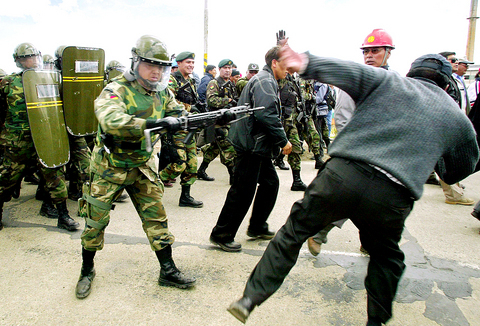Bolivian President Evo Morales signed a decree nationalizing a tin smelter owned by the Swiss mining company Glencore International, a first step toward his declared ambitions to win his government a larger share of Bolivia's mineral wealth.
Morales did not immediately name the terms for the takeover of the Vinto plant, the country's only operating smelter.
He stressed that Bolivia must not only control its rich mineral resources but also the refinement of raw ore into valuable metals.

PHOTO: AFP
"Our natural resources have been looted again and again," Morales told the smelter's employees on Friday.
"We have never been permitted to industrialize our own natural resources," he said. "With so many false pretexts ... they tried to keep Bolivia merely an exporter of raw materials. But now the hour has come to industrialize all of our natural resources."
Officials at Glencore and its Bolivian subsidiary Sinchi Wayra could not immediately be reached for comment.
Morales has spoken broadly about nationalizing Bolivia's mining sector, but the industry's complex structure means that it is unlikely to see an across-the-board move similar to last year's oil and gas nationalization.
The Vinto smelter, located near Oruro on the high Andean plain 180km southeast of La Paz, was -- until Friday -- entirely in private hands, but all of Bolivia's extensive mineral deposits are already owned by the government.
State mining company Comibol works a handful of the deposits, but most are mined through private concessions split between independent Bolivian miners' cooperatives -- most still working with hammer and chisel -- and giant international companies, including Glencore and US-based companies Coeur d'Alene Mines and Apex Silver Mines.
Morales has said that only those concessions left idle or lacking investment will be returned to the state.
In the meantime, the president has proposed a tax hike aimed at recovering more of Bolivia's soaring mineral revenues, driven in part by demand from China.
When Vinto was built in the 1970s, Bolivia exported mostly raw mineral ore, allowing other countries to reap the refining profits.
The Bolivian government sold the Vinto smelter in 2001 to Allied Deals, which later sold it to Comsur, a private mining company whose largest stockholder at the time was former Bolivian president Gonzalo Sanchez de Lozada.
Lozada fled Bolivia in October 2003 during riots against his administration and is still being sought in connection with a crackdown on the protests that left more than 60 Bolivians dead.
Glencore bought the plant from Comsur in 2004, but the shadow of Sanchez de Lozada remains a powerful political symbol in Bolivia.
On Friday, Morales declared that all other mining interests once held by Sanchez de Lozada must be returned to the state.

‘EYE FOR AN EYE’: Two of the men were shot by a male relative of the victims, whose families turned down the opportunity to offer them amnesty, the Supreme Court said Four men were yesterday publicly executed in Afghanistan, the Supreme Court said, the highest number of executions to be carried out in one day since the Taliban’s return to power. The executions in three separate provinces brought to 10 the number of men publicly put to death since 2021, according to an Agence France-Presse tally. Public executions were common during the Taliban’s first rule from 1996 to 2001, with most of them carried out publicly in sports stadiums. Two men were shot around six or seven times by a male relative of the victims in front of spectators in Qala-i-Naw, the center

Canadian Prime Minister Mark Carney is leaning into his banking background as his country fights a trade war with the US, but his financial ties have also made him a target for conspiracy theories. Incorporating tropes familiar to followers of the far-right QAnon movement, conspiratorial social media posts about the Liberal leader have surged ahead of the country’s April 28 election. Posts range from false claims he recited a “satanic chant” at a campaign event to artificial intelligence (AI)-generated images of him in a pool with convicted sex offender Jeffrey Epstein. “He’s the ideal person to be targeted here, for sure, due to

Australia’s opposition party yesterday withdrew election promises to prevent public servants from working from home and to slash more than one in five federal public-sector jobs. Opposition leader Peter Dutton announced his conservative Liberal Party had dropped its pledge that public servants would be required to work in their offices five days a week except in exceptional circumstances. “I think we made a mistake in relation to this policy,” Dutton told Nine Network television. “I think it’s important that we say that and recognize it, and our intention was to make sure that where taxpayers are working hard and their money is

DISPUTE: Beijing seeks global support against Trump’s tariffs, but many governments remain hesitant to align, including India, ASEAN countries and Australia China is reaching out to other nations as the US layers on more tariffs, in what appears to be an attempt by Beijing to form a united front to compel Washington to retreat. Days into the effort, it is meeting only partial success from countries unwilling to ally with the main target of US President Donald Trump’s trade war. Facing the cratering of global markets, Trump on Wednesday backed off his tariffs on most nations for 90 days, saying countries were lining up to negotiate more favorable conditions. China has refused to seek talks, saying the US was insincere and that it